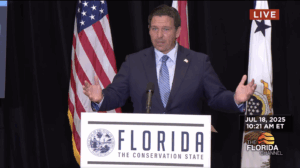
TEXAS
State of Texas Sets Records in Natural Gas Production
According to a Texas Oil & Gas Association report, Texas set record highs in natural gas output this spring, while oil production remained strong, emphasizing the state’s critical role in the U.S. and global economies. From January to May, Texas produced 42.2 percent of U.S. crude oil and 29.2 percent of its marketed natural gas. The state’s natural gas production reached 36.9 billion cubic feet per day, with marketed production at a record 34.4 billion cubic feet per day. In March, Texas exported $19.8 billion in energy products, including crude oil, refined products, hydrocarbon gas liquids, and natural gas. Europe accounted for 61 percent of Texas’ LNG exports and 40 percent of its crude oil exports. The Asia Pacific region received 57 percent of the state’s hydrocarbon gas liquids and 43 percent of its crude oil exports.
Renewables Businesses Celebrate Legislative Win
Several proposals to restrict or regulate solar and wind energy did not pass in the Texas House of Representatives this session. The bills, which aimed to ban offshore wind, create prohibitive land use requirements, and assign new costs to wind and solar farms, were rejected due to concerns about meeting growing electricity demand. Though the anti-renewable bills failed, bipartisan power grid bills passed, aiming to enhance ERCOT’s demand projections and implement an emergency shutdown program for large-scale electricity users.
Chlorine Gas Leaks in Brazosport Causes Health Concerns
Around 8,000 pounds of chlorine gas, a powerful disinfectant and chemical weapon, leaked from a Dow Chemical Company plant in Brazosport on May 20, triggering concerns about a health emergency. The gas, heavier than air and toxic at high concentrations, was used as a chemical weapon as early as World War I and can cause severe health issues including respiratory failure and death. The Brazosport leak did not result in any casualties and was less severe than a 2004 train crash in Bexar County, which resulted in the deaths of three people after the train crash released 60 tons of chlorine from a punctured tank car.
Galveston Reinforces Beach Area Against Coastal Erosion
The Jamaica Beach Coastal Erosion Planning and Response Act project, costing more than $5 million, will reinforce Galveston’s Jamaica Beach with 61,000 cubic yards of sand across 3300 linear feet of shore. FEMA will reimburse the Texas General Land Office for 90 percent of the costs of this project, which was originally conceived to repair damage caused by Hurricane Ike in 2008. Construction, which began on the west side of the beach, will build up the shoreline to a 5-foot elevation and is expected to be completed by late August 2025.
Surge in Proposed Gas Power Plants Poses Environmental Quality Issues
A new report highlights a surge in proposed gas-fired power plants in Texas, primarily in the Houston area, to meet the energy demands of AI data centers. These projects, totaling over 58 gigawatts of capacity, could increase greenhouse gas emissions by 13 percent and contribute to air pollution, posing health risks. The state’s encouragement of natural gas power generation, including taxpayer-financed loans, has expedited the permitting process, potentially leading to fewer pollution controls.
Meta Expands Acquisition of Geothermal Power Source
Meta, Facebook’s parent company, has signed a deal to buy 150 megawatts of power from XGS Energy, a Houston-based geothermal startup. This is Meta’s second major geothermal deal, following a similar agreement with Sage Geosystems. Geothermal power has typically been limited to regions with natural underground reservoirs, such as the American West, Iceland, and New Zealand. However, new startups are now promising to expand geothermal energy production by using advanced drilling techniques to access geothermal heat anywhere on Earth, enabling broader use of this renewable energy resource.
Texas Funds Microgrids of Critical Facilities to Support Grid Reliability
The Texas legislature has approved and finalized a $1.8 billion fund to support the construction of microgrids at critical facilities, such as hospitals and fire stations. The Texas Backup Power Package Program aims to enhance grid reliability and protect against extreme weather events. The program, which allows for solar, battery, and gas-powered microgrids, will help facilities with limited financial resources secure backup power.
LOUISIANA
Lawmakers Vote for Overhaul of Department of Transportation and Development
Louisiana’s Legislature passed a package of bills to overhaul the Department of Transportation and Development (DOTD), aiming to address road and bridge issues. The reforms include creating a new Office of Louisiana Highway Construction to manage state roads not eligible for federal funding and reorganizing DOTD with new offices for project delivery and transformation. The goal is to improve efficiency, privatize services, and enhance project delivery and bridge maintenance.
Utility Company Announces Search for New Buyer
Cleco, a Louisiana utility, is officially up for sale. The investor-owned utility, which provides electricity to nearly 300,000 customers across 24 Louisiana parishes, has begun its search for a buyer, with potential buyers including Entergy and Bernhard Capital Partners. The sale, expected to result in major changes for ratepayers and employees, has been long anticipated since Cleco’s current owner, Macquarie Infrastructure and Real Assets, acquired the utility in 2016.
Senate Approves Bill to Clean Up Old Drilling Sites
The Louisiana Senate approved a heavily amended bill to clean up old drilling sites in Louisiana, ensuring it becomes law. The bill, SB 244, led by Sen. Bob Hensgens, regulates court-ordered cleanups of old oil field sites and is a response to more than 600 legacy lawsuits aimed at addressing historical contamination. Despite dividing opinions, Gov. Jeff Landry supported the bill’s progress, criticizing the oil industry’s opposition. The final version preserved old procedures for existing cases and delayed new rule implementation until 2027.
Meta Data Center Energy Needs Concern Advocacy Groups
Entergy Louisiana plans to build three new gas-fired power plants to power Meta’s data center in northeast Louisiana, a project that could potentially strain the state’s already unreliable grid. Advocacy groups argue that the project, which will cost $3.2 billion, could lead to major outages and burden ratepayers across the state. Entergy maintains that safeguards are in place and that the project will benefit all customers, not just Meta.
New Training Center in Houma Offers Industry-Accredited Safety Certifications
Maersk Training has opened a new Maritime & Safety Training Facility at Fletcher Technical Community College in Houma. The facility will offer industry-accredited training courses focused on Offshore Safety and Survival, as well as industrial safety, with certifications approved by industry bodies, such as OPITO, OSHA, STCW, IADC, and API. The partnership aims to equip workers with essential skills and certifications to enhance safety and performance in the oil, gas, maritime, and renewable energy sectors.
MSC Halts Shipping Route to Asia from Port of New Orleans
Mediterranean Shipping Co. (MSC), a major operator at the Port of New Orleans, will temporarily halt its direct shipping route between Louisiana and several Asian ports, citing President Trump’s trade policy changes as the reason. MSC plans to suspend two routes between Asia and the U.S. and alter four others following tariff announcements that have decreased container shipping traffic. MSC is one of the port’s largest revenue generators, contributing around $4.5 million in the fiscal year ending June 2024. The suspension reflects broader challenges in the global shipping industry due to fluctuating tariffs imposed by the Trump administration.
MISSISSIPPI
Jackson Installs New Free EV Chargers
The City of Jackson installed 10 new electric vehicle chargers, funded by a $160,000 donation from Entergy. The chargers, located at the Warren Hood Building, Thalia Mara Hall, and Union Station, are currently free to use. Entergy purchased the chargers from Tesla, and they were installed by the nonprofit Adopt a Charger via local contractor Lavallee. Lavallee will also maintain the chargers for Jackson. The city will incur a nominal annual cost of $600 for the chargers. Adopt a Charger collaborates with private companies like Entergy to sponsor public charging stations. The nonprofit has established similar stations at the Mississippi Children’s Museum and Hinds Community College in Raymond.
FEMA Aid Request Approved
The Trump administration approved Mississippi’s request for federal assistance to recover from deadly tornadoes and severe weather from March storms. The federal government will cover 100 percent of costs for FEMA’s Individual Assistance aid and 75 percent of costs for FEMA’s Public Assistance. Eleven counties qualified for Individual Assistance, while 17 counties qualified for Public Assistance. The March storms resulted in the deaths of seven individuals in Mississippi and caused injuries to dozens more. Nearly 1,000 homes were damaged.
ALABAMA
University of Alabama Studies Fortified Building Outcomes
A study led by the Center for Risk and Insurance Research at the University of Alabama’s Culverhouse College of Business, in partnership with the Alabama Department of Insurance, highlights the economic and protective benefits of climate-resilient construction methods, specifically fortified standards, for homes affected by hurricanes. Examining insurance claims from Hurricane Sally in 2020, the study found homes built or retrofitted to Fortified standards experienced fewer and less costly damages. The study shows that if all homes in Mobile and Baldwin counties met these standards, insurance payouts could have been reduced by 75 percent, saving insurers and policyholders a combined total of about $147 million. Alabama provides substantial insurance discounts and grants to homeowners employing Fortified methods.
State Director for Rural Development Appointed by Trump Administration
Twinkle Cavanaugh, former president of Alabama’s Public Service Commission, has been appointed as the state director for rural development under the Trump administration. Cavanaugh, known for her support of fossil fuels and opposition to environmental regulations, oversaw electricity rate increases during her tenure at the PSC. Her appointment has invited controversy, as critics argue that her decisions as head of the Public Service Commission favored utility companies over consumers.





















